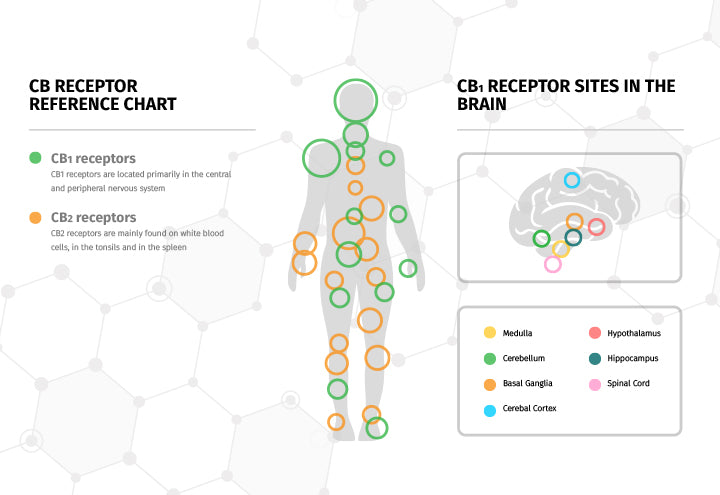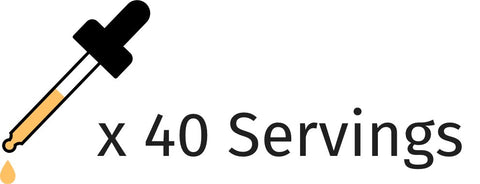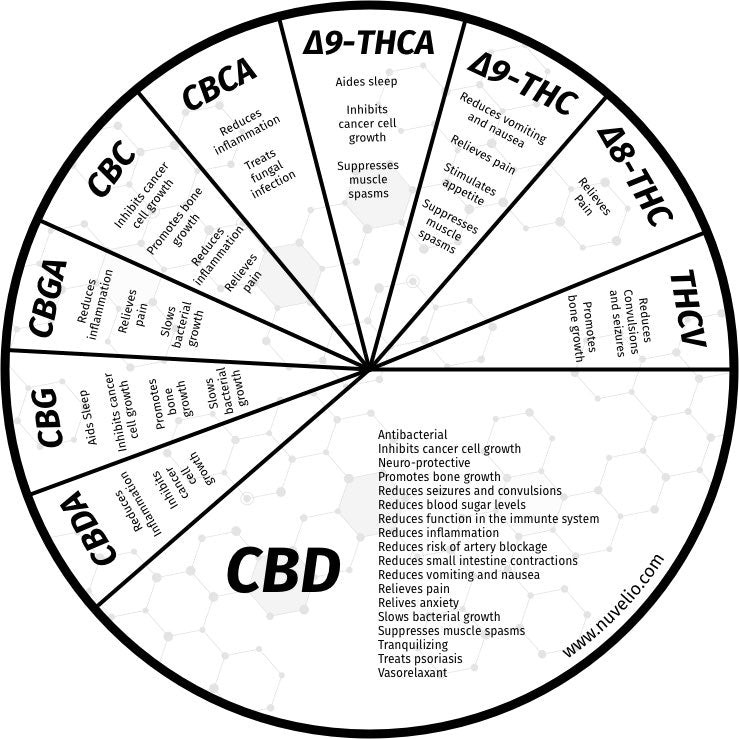CBD Oil: Uses, Benefits & Risks

If you have heard the amazing miracle cures of CBD oil, you are not alone. But is it all it is cracked up to be?
Although CBD is derived from a cannabis plant, it is still considered a medicine much like any over the counter supplement you may take.
Just as you should talk with your doctor and research those supplements, it is important to do the same with CBD oil.
CBD oil has been studied and proven to have amazing benefits to those who take it; however, it never hurts to be fully informed.
What is CBD?
CBD is an abbreviation for Cannabidiol. Cannabidiol is a cannabinoid found in cannabis plants such as marijuana and hemp.
There are over 100 different cannabinoids found in the hemp and marijuana plants. However, the ones that are most known are CBD and THC.
THC is the active ingredient in marijuana that gets you “high.” CBD is taken out of the hemp or marijuana plants and is not psychoactive. Meaning it can’t get you “high”.
Our bodies actually make cannabinoids which are known as endocannabinoids. Cannabinoids such as THC and CBD are called phytocannabinoids because they are from a plant.
The Endocannabinoid System
Many people are familiar with the systems of the body, but you have probably never heard of the Endocannabinoid system.
The best way to describe the endocannabinoid system is that it is a balancing system. It keeps our bodies in homeostasis.
This system sends neurotransmitters (message and communication molecules) to all the parts in your body making sure everything is running smoothly.
When our system finds a problem, it regulates it by sending more instructions to the receptors adjusting how we think and feel.
Within our endocannabinoid system, we have cannabinoid receptors: CB1 and CB2 are the two receptors that we know about.
Cannabinoids such as CBD looks for and activates cannabinoid receptors and when they get together, they tell your body to feel a certain way and do certain things.
These receptors are activated by cannabinoids that we make and the cannabinoids found in the hemp and marijuana plants. It is kind of like a lock and key.
When these receptors are activated, it can affect different parts of the body depending on which receptor is activated.
CB1The CB1 receptors are located in the brain and throughout the nervous system. They are also found in the lungs, liver, and kidneys.
Our natural endocannabinoids and the cannabinoid THC typically bind with the CB1 receptors. This is what gives people relief from pain, nausea, depression, and other things.
CBD doesn’t always bind with this receptor, but it can occasionally.
CB2The CB2 receptors are typically found in the immune system, spleen, and the gastrointestinal system. CB2 receptors bind best with our natural endocannabinoid 2-AG.
However, the phytocannabinoid CBD is closely related and is found to bind with CB2 receptors as well. These receptors regulate appetite, the immune system, inflammation, and pain management.
Third ReceptorThere is scientific evidence of a new, third cannabinoid receptor. This receptor would be for the cannabinoid CBN.
CBN is another cannabinoid-like CBD that is found in hemp and marijuana plants. Research on this third receptor is in its infancy and inconclusive at this time. But, it is thought to work on the body in the same way.
How Can I Use CBD?
It is important to know how you use CBD oil to ensure you are getting the desired effect instead of the opposite effect.
When taking CBD oil, you should only consume the recommended serving size. Taking more or less can produce the opposite effect you are trying to achieve.
You should also keep in mind that some people may metabolize CBD differently due to abnormalities within the enzyme system. You may find an unintended increase or decrease in CBD concentrations in your blood.
It is important that if you suspect you are not metabolizing CBD as you thought you would ask your doctor to test your cytochrome P450 enzyme system before adjusting the dose you are taking.
Another factor to consider when using CBD oil is what ailment you are looking to alleviate. CBD needs to be taken in different doses depending on what it is used for.
Below, you will find a dosing chart based on different illnesses or ailments that you can work from.
Discuss this chart with your doctor:
Illness/Ailment |
Dosage of CBD |
|
Loss of appetite in cancer patients |
1 mg of CBD for 6 weeks with THC |
|
Chronic Pain |
2.5-20 mg of CBD daily |
|
Epilepsy |
200-300 mg of CBD daily |
|
Huntington’s Disease |
10 mg of CBD per KG of body weight daily |
|
Sleep Disorders |
40-160 mg of CBD at night |
|
Multiple Sclerosis |
2.5-120 mg of THC/CBD combination daily |
|
Schizophrenia |
40-1,280 mg of CBD daily |
|
Glaucoma |
20-40 mg of CBD daily |
|
ADHD |
35-90 mg of CBD daily |
|
Depression |
5-25 mg of CBD daily |
|
Anxiety |
40-600 mg of CBD daily |
What are the Benefits of CBD?
There are many different benefits of CBD, and many of them have been studied by The National Center for Biotechnology Information.
On this website, you can see all the studies done on CBD as well as some of the new research that has been researched. This is a great website to become an informed person on CBD.
According to the NCBI, we have found that CBD can help with specific diseases and ailments including the following:
Epilepsy
CBD has most notably been studied in those suffering from epilepsy. In fact, the brand Charlotte’s Web was named after a little girl who suffered from seizures.
Charlotte made impeccable improvements and her seizures drastically decreased when she was given CBD. CBD is used when people with epilepsy don’t respond to other drugs.
In a 3-month study, children and young adults with treatment-resistant epilepsy were given a purified 98% based CBD extract to reduce seizures. The seizures were reduced by half in 39% of them.
In another study of 214 children and adults, CBD reduced seizures and patients were given the maximum dose.
Not only have the studies been incredible, but 84% of parents of children who suffer from epilepsy claimed CBD reduced their child’s seizures.
In fact, two parents said CBD completely resolved their child’s seizures.
Natural Pain Relief
Before we even knew cannabinoids such as CBD existed, people used marijuana to treat pain. In fact, marijuana has been used for pain as far back as 2900 B.C.
As we have learned more about our bodies and the cannabis plant, scientists have discovered that certain components of the cannabis plant, including CBD, are responsible for pain-relieving effects.
Studies have shown that CBD helps reduce chronic pain by activating our endocannabinoid receptor responsible for inflammation.
In other countries, an oral spray called Sativex has been approved to treat pain associated with Multiple Sclerosis. This spray is a combination of both THC and CBD.
When Sativex was studied, it was proven that those treated with Sativex for one month experienced a drastic improvement in pain, muscle spasms, and walking as compared to the placebo group.
Sativex was also studied with 58 people who had rheumatoid arthritis. Their pain was significantly improved.
Neurological Disorders
Researchers believe that because of CB1 and CB2 receptors are found throughout the nervous system that CBD may play an important role in providing benefits for those with neurological disorders.
Second, to epilepsy, treating neurological disorders is one of the most studied uses for CBD. Though epilepsy is also neurological as well.
As stated above, Sativex has been proven to be an effective way of reducing muscle spasticity in people with multiple sclerosis and other neurological disorders.
In fact, one study found that it reduced spasms in 75% of the 276 people that were studied. These people were resistant to other forms of medication.
Another study found that CBD oil not only helps those with epilepsy but those with Dravet Syndrome.
When CBD was studied in people with Parkinson’s disease, researchers found that it improved their quality of life and sleep.
Additionally, CBD was studied in animals and test tubes and has been found to be promising in preventing neurodegeneration such as Alzheimer’s disease.
Cancer
Approximately 38% of people will be diagnosed with cancer at some point during their life. This is an astronomical number that keeps rising.
As cancer is becoming more common, scientists are desperately trying to find a cure for it. Chemo and radiation are currently our only means of fighting it, and they have horrible side effects.
Originally, marijuana and CBD were used to help cancer patients with symptoms of Chemo and radiation such as nausea, vomiting, and pain.
Studies proved that treatment with cannabis did help reduce nausea and vomiting associated with chemotherapy.
We have found that patients with pain related to cancer treated with both CBD and THC had a significant reduction in pain when pain medication did not work.
However, with other studies involving animals and test-tubes, CBD may also have anticancer properties. In one test tube, the study found that concentrated CBD induced cell death in breast cancer cells.
In a study with mice, CBD inhibited the spread of an aggressive breast cancer. However, more studies are needed to confirm it works for humans.
Anxiety and Depression
Depression and anxiety are common among people with mental health disorders. Both anxiety and depression have devastating impacts on health and well-being.
Because of the effects of anxiety and depression, we have continuously researched ways to alleviate it. These disorders are usually treated with medications that cause numerous side effects.
Not only can pharmaceutical drugs cause drowsiness, agitation, insomnia, sexual dysfunction, and headaches, but some medications like Benzodiazepines are addictive.
However, CBD is being researched as a promising treatment in alleviating both depression and anxiety without the side effects.
In a study of 24 people suffering from social anxiety, they were given 600 mg of CBD before public speaking. Half were given a placebo.
The group that actually got CBD had significantly less anxiety and discomfort during their speech than those who had the placebo.
CBD has also been used to treat insomnia and anxiety in children with PTSD, naturally. In several animal studies, it acted as an antidepressant.
CBD works for anxiety and depression because of its ability to act on the receptors in the brain that regulate serotonin, mood, and social behavior.
Along with these studies, CBD has shown promise in helping with other ailments such as:
- Smoking cessation
- Alleviating drug addiction
- Treating antipsychotic effects
- Preventing diabetes
- May help with Insomnia
- Calming those with ADHD
- Antitumor benefits
- Helping with acne and psoriasis
- Could benefit heart health
If you are looking for a benefit of CBD oil that isn’t on this list, it is safe to say it probably does exist. Since cannabinoid receptors are found throughout the body, cannabinoids such as CBD can have benefits in many areas of the body.
What are the Risks of CBD?
Just like with other medications, there are risks when taking CBD. Although there are many benefits, it is important to know the risks involved when self-medicating.
Because the FDA has not approved CBD as a medicine, doctors cannot prescribe CBD to patients. This means that if you choose to take CBD, you are taking it at your own risk, independently from medical professionals.
Here are a few of the risks involved with taking CBD oil:
#1 There are Unproven Cures
Many of the claims regarding CBD curing certain ailments is all in speculation based on how our receptors work with cannabinoids. For example, it has not been proven to cure cancer.
Although we are not saying these cures are not possible, the problem is that there have only been one or two studies done on animals or humans.
A proper study includes a control group. This means one group receives CBD and the other receives a placebo.
Because many studies do not have a control group, we do not know that we are seeing a true effect of the drug or a placebo effect.
#2 There is a lack of regulation on CBD
Because there is a murky legality of hemp and marijuana as medicine, the FDA has not stepped in to regulate CBD oil. States are struggling to put regulations in place.
Because of the lack of regulation, a study found that 7/10 CBD products did not contain the amount of extract labeled on the package. 43% contained too little CBD and 26% contained too much.
Also, it was found that ⅕ of CBD products contained more THC than the legal limit.
#3 Interactions with other Medication
One of the most concerning risks is that CBD has known interactions with other medications, and we don’t have enough research to know all of them.
This means that if you begin taking medication without talking to your doctor about medication interactions, you could have an opposite effect or a worse effect from taking CBD.
In fact, CBD has a known interaction with anti-epilepsy drugs which causes the liver to increase enzymes. Therefore, people taking anti-epilepsy drugs may need to adjust dosages.
While CBD has shown to increase liver enzymes in 10% of people studied, the NCBI has determined it improves brain and liver function.
Because of this evidence, it is important to seek out a doctor knowledgeable in CBD before taking it especially if you are on other medications.
Medications that interact with CBD include:
- Steroids
- HMG CoA reductase inhibitors
- Calcium channel blockers
- Antihistamines
- Prokinetics
- HIV antivirals
- Immune modulators
- Benzodiazepines
- Antiarrhythmics
- Antibiotics
- Anesthetics
- Antipsychotics
- Antidepressants
- Anti-epileptics
- Beta-blockers
- PPIs
- NSAIDs
- Angiotensin II blockers
- Oral hypoglycemic agents
- Sulfonylureas
#4 No FDA Approval
As stated above, there is no FDA approval. Therefore, CBD is not properly regulated. Meaning any John Doh can make and sell CBD.
This also means that there have not been enough studies done to determine all the benefits, risks, and effects of CBD.
The FDA regulates medications in a way that ensures each medication meets a set of criterion. Without this regulation, companies can sell CBD that doesn’t meet strict regulations.
The FDA also looks into double-blind studies. This means there are two groups of people. One group is given CBD for an ailment and the other is given a placebo (sugar pill).
This is done to rule out people feeling like CBD is working when it actually isn’t. This is known as the placebo effect.
#5 Smoking CBD is Risky
Many people have begun smoking CBD as a means of getting it to the bloodstream faster. Not only does this type of CBD look like marijuana, but it can be risky to smoke it.
Smoking anything is risky and can be associated with lung cancer. Because CBD is not regulated, many retailers have put other harmful chemicals into the CBD you would be smoking.
Although it is marketed to help you, CBD made or extracted with other harmful chemicals is detrimental to your health and takes away any health benefits you may get from the CBD itself.
#6 Side Effects
Generally, CBD is tolerated well even at high doses. However, along with risks, there are a few side effects that have recently been studied. These side effects include:
- Allergic reaction. Some people are actually allergic to cannabis plants.
- Dry mouth. Many people have reported a dry mouth after CBD use.
- Tiredness. Due to alleviating stress hormones, CBD can cause tiredness.
- Anxiety. This is only found in extremely high doses of CBD.
- Interferes with the reward system. When combined with THC, CBD can interfere with the bodies motivation and reward system.
Determine if CBD is Right for You
Is CBD right for you? This isn’t something that can be answered in this article. It is something that should be discussed with your doctor.
If you take medications or have specific ailments you want to fix, it is important to speak with a doctor who specializes in CBD oil.
Doctors who specialize in homeopathic medicine will most notably be able to help you with CBD. However, it is important to do your research so you understand fully what the doctor is saying.
Have you tried CBD oil? What benefits outweighed the risks for you? Share them in the comments below!
Visit Leafly to find a doctor in your state that specializes in medical cannabis. These doctors not only specialize in CBD but marijuana as well.
If you do not see a doctor in your state, this is because your state has not legalized marijuana as a medicine.
If your state has not legalized medical use of cannabis, you can search for a registered homeopathic doctor at The North American Society of Homeopaths to find a doctor in your state.
Is there anything else you would like to know about CBD? Share your questions in the comments below!
References
- Johnson, J. (2018, July 27). CBD oil: Uses, health benefits, and risks. Retrieved from https://www.medicalnewstoday.com/articles/317221.php.
- 7 Benefits and Uses of CBD Oil (Plus Side Effects). (n.d.). Retrieved from https://www.healthline.com/nutrition/cbd-oil-benefits.
- Thompson, D. (2018, May 07). CBD Oil: All the Rage, But Is It Safe & Effective? Retrieved from https://www.webmd.com/pain-management/news/20180507/cbd-oil-all-the-rage-but-is-it-safe-effective.
- Helen. (2018, November 15). 24 CBD Oil Health Benefits & Effects (Cannabidiol) Dosage. Retrieved from https://www.selfhacked.com/blog/cannabidiol-cbd/.
- Cannabidiol: Uses, Side Effects, Interactions, Dosage, and Warning. (n.d.). Retrieved from https://www.webmd.com/vitamins/ai/ingredientmono-1439/cannabidiol.






Leave a comment